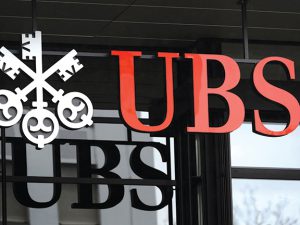Bloomberg
UBS Group AG reported weaker-than-expected profit in the second quarter, as the global market sell-off kept wealthy clients on the sidelines and institutional investors pulled funds.
The Zurich-based bank reported net income of $2.1 billion, compared with analyst estimates of $2.4 billion. The quarter was impacted by lower revenues at the key wealth management business, outflows in asset management and investment banking results that also trailed expectations.
Global banks are confronting the reality of surging prices and slowing economic growth, while lockdowns in China have hurt demand for trading and
investment products. While Zurich peer Julius Baer Group Ltd signalled optimism that the “worst is through†for the equities sell-off, UBS said it expects client nervousness to persist.
“We saw private clients, given all the uncertainty, sidelining their money and waiting for things to clear up,†Chief Executive Officer Ralph Hamers said in an interview with Bloomberg Television’s Manus Cranny. Earlier, he called the second quarter “one of most challenging periods for investors in the last 10 years.â€
UBS shares slumped in early trading in Zurich, down 6%.
The Swiss bank posted pre-tax profit for its wealth management business of $1.16 billion, weighed down by a slump in client trading activity particularly in the Americas and Asia. While Asia posted stronger inflows that could signal an activity rebound ahead, overall net new fee-generating assets were muted.
The asset management division suffered $12.1 billion in outflows as investors exited equities during the turbulent quarter. The unit’s revenue included a gain from the sale of UBS stake in a Japanese real-estate venture partly held with Mitsubishi Corp.
UBS’s investment bank, which is heavily geared towards equities, posted profit before tax of $410 million in the second quarter, compared with analyst estimates for income of about $511 million. Trading revenue was up 4%, after the effects of last year’s default of Archegos Capital Management were accounted for.
UBS also cited lower compensation costs at the investment bank, as the market declines cool what had been a fierce bidding contest for talent.
By comparison, US banks recorded an average 31% gain in trading fixed income, currencies and commodities in the quarter, and an 8% average boost to equities trading
revenues.
UBS confirmed its plans to buy back around $5 billion in shares this year, with more than $3 billion already completed in the first half.
The lender also signalled the potential for higher litigation provisions relating to a long-running French tax evasion case, and said that in general, the bank continues to be “exposed to a number of significant claims and regulatory matters.â€
UBS confirmed it is cooperating with US authorities on a probe “relating to business communications sent over unapproved electronic messaging channels†— a reference to the regulatory crackdown on using services including WhatsApp that’s set to cost investment banks including Morgan Stanley about $1 billion in fines.
Russia’s invasion of Ukraine has sent a jolt through markets as investors tap banks for protection against inflation, hedge against currency swings and take positions in choppy stock markets. European lenders are also benefitting from the first increases in official interest rates in more than a decade.
 The Gulf Time Newspaper One of the finest business newspapers in the UAE brought to you by our professional writers and editors.
The Gulf Time Newspaper One of the finest business newspapers in the UAE brought to you by our professional writers and editors.
